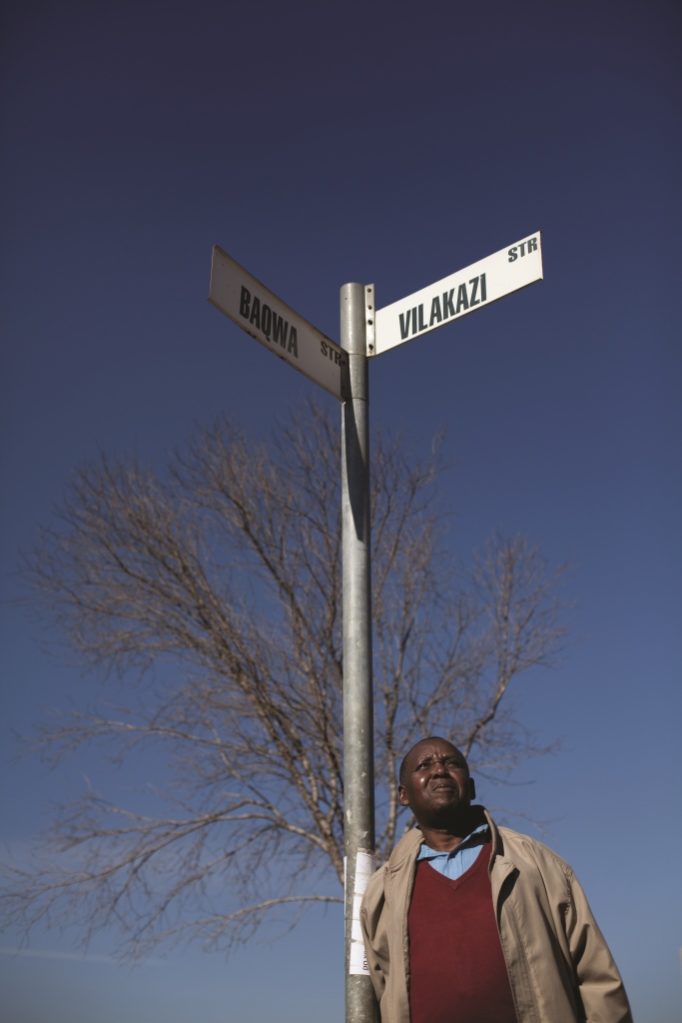Until he was 14 years old Jabu Mofomo had no idea how important his neighbor was. To Mofomo, the man next door merely spent hours writing on his porch and would jump the fence to gather up his son Magkatho after a day’s play. It was only when he jumped the fence in desperation one night that it dawned—his neighbor was Nelson Mandela.
Every day, Mandela would arrive home in his 1952 Morris. It was the talk of the street as he was the only one to own a car. He was always immaculately dressed, in an English suit and waistcoat. Mofomo would wave to Mandela from his home next door on Vilakazi Street, Soweto. Mandela always took time to greet his neighbors, he says.
Madiba, as Mandela is known by his clan name, also took time to organize the children in his street into a football club.
“He called us to his house, there were about sixty of us. We were able to squeeze into his place. He told us that he wanted to start a football club. To suggest names for a football club, we brought about 60 names. He wanted everyone to contribute. After an hour, he came out and said ‘Guys, I don’t like your names, you’re too Eurocentric. I would like football to have a different name.’ Mandela suggested the name of a wise Xhosa chief, Mochochonono, we all laughed. Any club that was named with an African name, at that time, would have been very strange,” he says.
But troubled political times overtook football.
Loading...
“He promised to come back after two weeks. But that was the beginning of the end of us seeing Mandela. He was already in Libya. Things had intensified.”
In 1960, South African police gunned down 69 people in what was to become known as the Sharpeville Massacre. Mandela stood outside Mofomo’s house burning his passbook in protest against the deaths.
Mofomo says police raids increased, from this day, at the Mandela home.
“The police didn’t suspect anything about us. Even though, we lived right next door. I still recall some of the inspections at Mandela’s house, of what was happening around us, but I was too young to understand what was going on,” says Mofomo.
One night the raids were too close for comfort. Mandela jumped the fence with an armful of books telling Mofomo’s mother to hide them. They hid them in their house for two years and then, in fear, buried them in 1962.
For more than half a century, secret political documents remain buried in Vilakazi Street. In that time, Mofomo married and South Africa became a democracy. When the time came to dig up the books, no one could remember where they had been buried.
The last time anyone saw the books; they were covered in plastic, thrown into a sack and buried in the ground, so there is a chance that they are still intact. Mofomo says his mother couldn’t read and he was too young, so they never knew what was written in them.
The man who used to wash Winnie Madikizela-Mandela’s car now makes a living out of words. Inspired by his illustrious neighbor, he worked as an investigative journalist for six years. Mofomo says he joined the Catholic Commission for Justice and Peace, where he helped smuggle money to underground political organizations, especially the African National Congress.
In the late 1980s, Mofomo suffered police scrutiny; he went underground and worked for Liberty Life, a wealth management group, pushing paper.
“At the time, I was a prominent journalist. Things were not good then. I was doing a lot of investigative journalism stories about households that had been taken over by superintendents; evictions under the apartheid laws. I was exposing a lot of those kinds of things. You are either under surveillance, or else you were detained. But I was never detained,” he says.
These days, Mofomo enjoys his retirement supporting Soweto football giants Orlando Pirates and the Stormers, a Cape Town rugby team. Along with discarding the name Charlie, which he was given in apartheid days, he still visits the old house on Vilakazi Street number 8067/4, where his grandchildren live. It’s the only street to be home to two Nobel Peace Winners: Mandela and Archbishop Desmond Tutu.
The house looks very different from the days of his childhood, he says. It was rebuilt after a gas explosion rocked its foundations two years ago. To this day, half a century later the books have yet to surface; most likely, he says, they’re under at least two inches of cement. A piece of African history that may be lost, but not forgotten.
Loading...
